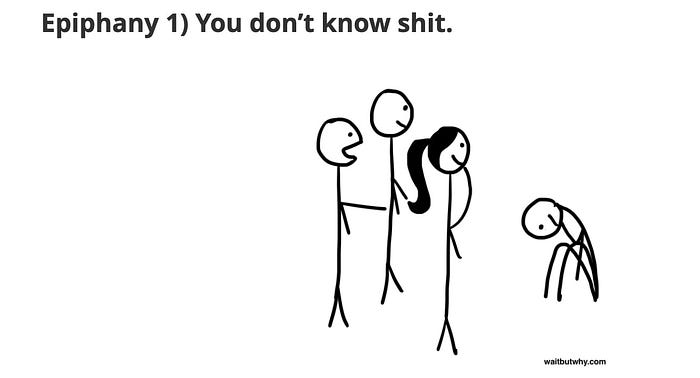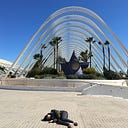Minerva 的第三課:科學下的謙卑
在台大的傳統教育模式下,講課的老師是知識的中心,問題永遠有正確答案。反之 Minerva 的教育是以科學為核心的教育,著重問問題而不是答案。課堂設計也不是老師中央集權,而是群相制度,老師發言通常不過五分鐘,還給學生學習的主導權。在這樣的環境下,我培養不少好奇心,學到如何更開放的問問題。我把科學精神的探索和開放性濃縮成兩個思維,叫做「容許犯錯」和「坦承無知」。
容許犯錯
身為台灣的資優生,我習慣每一題最好都要答對,少犯錯,不然會被扣分的學習。在台大時,教授們也常說:「未來老闆是不會讓你犯錯的。」因此來到歐美教育,老師大聲跟我說:「什麼?第一次學本來就會犯很多錯,擔心什麼?」的時候,帶給我很大的震撼。在 Minerva 之前,荷蘭交換的那一年,記得有個坐在旁邊的荷蘭人翹著二郎腿上課,還會大膽的舉手,跟教授說:「你講錯了啦!」真的嚇到尊師重道的我了。但教授看起來不但沒有被冒犯,還乖乖的讓把他的舞臺交給那個同學,讓他上台講課。
我學到不論是老師或是學生,都是可以犯錯的。因為在科學精神下,犯錯不只是一件理所當人的事情,它就叫做實驗。
坦承無知
第二件讓我驚艷的是,老師會告訴我:「我不知道。」當然,不是所有老師都能夠如此坦誠,但我想講兩個我和 Minerva 教授的互動,說明他們帶給我的啟發。
大一自然科學的教授充滿熱情,哈佛醫畢業的他,是個嚴格卻專業老師,會緊盯沒有讀書就來上課的同學。大一的自然課是科學方法論,很多都在說怎麼在無知中測驗假說、挑戰自己的偏見等等,但是書終究是書而已。直到有一次同學問他問題,他頓了一下,回答:「我會說我不知道。」我感到非常吃驚。這門課如此基礎,說不知道會感覺好丟臉啊!他大可以含糊帶過,或是告訴我們這個問題不重要,保護他人師的尊嚴,但他卻說「不知道」。
一位資工的老師也是如此,有一天我奇怪的腦袋問了他我也不知道合不合理的問題,但他不但沒有罵我笨或是不該這麼想,還跟我說:「雖然我不是很理解,但是我很期待你自己去探索再來教我。」
科學精神鼓勵問問題、研究假說、鑽研求解,而不是答對問題。而看見老師的知行合一,讓我想鼓勵我發揮更多的好奇心,去嘗試他們也不清楚的問題。他們教會我,不論畢業於多麼頂尖的社會機構,在科學下,我都要保持謙卑,不要害怕自己的無知。

總結
寫這篇文章主要目的,是提醒我自己老了的時候,不要變成倚老賣老、自以為是的臭臉頑固老人,希望可以像理察·費曼一樣,是好奇又好笑的老玩童,如果你們已經讀到這裡了,對不起,你們已經肩負我的監督夥伴的重任了。
因爲,歐美教育的科學精神教給我的是,我們都是大千世界下探索的渺小人類,老師可能是考試的正解,但不是科學的真確。我們都可以說不知道,都可以犯錯,不用害怕冒犯與被冒犯,因為我們尊重不是教室裡的權威,而是在科學前的謙卑。

Minerva 畢業系列
• Minerva 畢業
• Minerva 的第一課:專心致志遠勝聰明才智
• Minerva 的第二課:環境的重要
• Minerva 的第三課:科學下的謙卑
• Minerva 的第四課:何謂視野
The Third Lesson in Minerva: Humility in Science
In the traditional education model at National Taiwan University (NTU), the lecturing teacher is the center of knowledge, and there is always a correct answer to questions. In contrast, Minerva’s education is centered around science, emphasizing asking questions rather than providing answers. The classroom design is not centralized around the teacher; instead, it follows a system of active participation, where teachers’ speeches typically last no more than five minutes, giving students the autonomy to take charge of their learning. In such an environment, I developed a lot of curiosity and learned how to ask more open-ended questions. I condensed the spirit of scientific exploration and openness into two mindsets, which I call “allowing mistakes” and “acknowledging ignorance.”
Allowing Mistakes
As a gifted student in Taiwan, I was accustomed to aiming for perfect answers to every question to avoid losing points in my studies. At NTU, professors often emphasized, “Future bosses won’t allow you to make mistakes.” Therefore, when I came to experience education in Europe and America, the teachers loudly told me, “What? Making mistakes is normal when learning something for the first time. What’s there to worry about?” it was a significant shock for me. Before Minerva, during my exchange year in the Netherlands, I remember a Dutch student sitting next to me, confidently raising their hand and telling the professor, “You made a mistake in your explanation!” It truly astonished me, as I was brought up to show great respect for teachers. However, the professor didn’t seem offended at all; on the contrary, he willingly handed over the stage to that student, allowing him to give a lecture.
I learned that both teachers and students can make mistakes. Under the spirit of science, making mistakes is not only acceptable but also an essential part of the learning process — it is called experimentation.
Acknowledging Ignorance
Another thing that amazed me was when teachers would tell me, “I don’t know.” Of course, not all teachers could be so candid, but I’d like to share two interactions I had with Minerva professors that illustrate the inspiration they gave me.
In my first year, I had a passionate professor for Natural Sciences, a Harvard Medical graduate. She was strict yet professional and would keep a close eye on students who hadn’t studied before coming to class. The course focused on scientific methodology, discussing how to test hypotheses in ignorance and challenge one’s biases, among other things. But it was all just theory until one day, a classmate asked her a question. She paused for a moment and replied, “I will admit that I don’t know.” I was truly astonished. This foundational course made it feel embarrassing to say “I don’t know”! She could have brushed it off vaguely or told us that the question wasn’t important, preserving his dignity as a teacher. Instead, She said, “I don’t know.”
A Computer Science professor was similar. One day, I asked him a question that might have seemed foolish or unreasonable, but he didn’t scold me or tell me I shouldn’t think that way. Instead, he said, “Although I don’t quite understand it, I look forward to you exploring it and then teaching me.”
The spirit of science encourages asking questions, exploring hypotheses, and seeking solutions, rather than just giving correct answers. Witnessing the alignment of their words and actions, I felt motivated to unleash more curiosity and attempt questions that even they didn’t have clear answers to. They taught me that regardless of graduating from prestigious institutions, in the realm of science, I should remain humble and not fear my own ignorance.

Summary
The primary purpose of writing this article is to remind me not to become an old person who relies on my age to be stubborn, arrogant, and closed-minded. Instead, I aspire to be like Richard Feynman — a curious and humorous old child — even in their old age. I hope that by expressing this intention, all of you who have reached this point in the article will hold me accountable and become my accountability partners.
The essence of the science spirit in Western education has taught the author that we are all tiny explorers in the vast world. While teachers may provide correct answers for exams, they do not possess absolute truths in science. It is acceptable for everyone to admit when they don’t know something and to make mistakes without fearing offense or being offended. Respect in this context is not for authority figures in the classroom but for humility in the face of scientific exploration.
